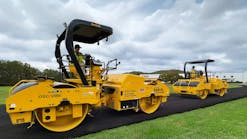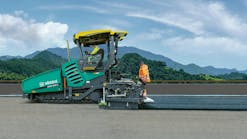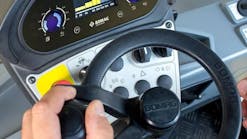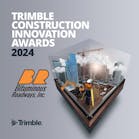TriStar Aggregates, Inc., Pawnee, Texas, needed a lot less fines and a lot more overall production to get maximum productivity from their 5,000-acre Blackburn Quarry at Berclair, Texas, about 70 miles south of San Antonio. TriStar caters primarily to the oil field market, natural gas deep wells and commercial projects on the Texas Coast, mostly in the Victoria, Port Lavaca and Refugio areas. TriStar produces a variety of products from a relatively soft limestone called "caliche," which is Spanish for "white rock." "Our fines content was much too high and was contaminating our products, especially our 2-1/2-inch oil field product," said Jackie Arnold, TriStar vice president and operations manager. "We needed to do some very effective scalping to solve this problem. Also, we needed to increase overall production substantially to keep up with growing oil field demands. Generally, when an oil field customer needs aggregate, they need a lot of it at one time — and they need it right now!" "We checked out several brands of scalping/screening equipment, talked to the dealers and manufacturers — told them our problems, our goals, our production requirements, our Wet Ball Hardness test ranges, showed them around the quarry; then asked for their recommendations," Arnold explained. "Excel Machinery, the Terex Finlay dealer, seemed to best understand our needs and know how to meet them. "Excel showed up in work boots and pickup trucks — my kind of people — boots on the ground. Excel recommended the track-mounted Terex Finlay 883 Reclaimer. All the others recommended wheel-mounted machines. All the machines recommended were scalping/screening plants designed to do essentially the same thing. "We brought in each brand of machine on a trial basis," he continued. "The Terex Finlay 883 was the sturdiest and best by far — for fines separation — and for production volume and efficiency. We're running the 883 at about 350 to 400 tons per hour with its three discharge conveyors that stockpile fines, 2-1/2-inch stone, and oversize. The oversize goes to our crusher to produce Type A commercial, 1-inch by 3-inch and screen drop. We could run higher tph if we changed screens in the 883, but we don't see the need for it at this point. "Also, moving a track machine to follow the quarry face is very simple with the radio controlled operation. Just walk along beside the machine as the tracks run it to the new site. "We rented the 883 for three months to be absolutely sure it was right for us," Arnold continued. "I was satisfied with its performance. But the Excel people told me they thought it would work better with a special punch plate instead of grizzly bars to increase production and better protect the screen from the type of large incoming rock we have. Excel is a manufacturer, as well as a dealer. They designed and made the punch plate, and everything works fine. This is something they initiated. I didn't have to ask for it." TriStar changes the oil regularly and does daily maintenance checks to see that everything is in proper working order. There has been no unplanned downtime. An electronic computer system will shut the plant down if any problems occur. The 883 plant design features a super heavy-duty screen with 16-foot by 5-foot top deck and 12-foot by 5-foot bottom deck with hydraulic drive, heavy-duty bearings and 6.53-cubic-yard hopper. Screen meshes are side tensioned on the top deck and end-tensioned on the bottom deck. The horizontal, wide-mouth apron feeder has a Hardox steel pan with hydraulic variable-speed chain drive through a high-torque gearbox. Available on tracks or wheels, the unit is engineered for fast setup, high mobility and long service life in high-volume crushed stone, sand/gravel, topsoil, coal, compost, and recycling applications. "We strip off about 6 feet of overburden to get down to the caliche limestone that runs about 30 feet deep, which we shoot and run through the 883 Reclaimer," Arnold added. "Caliche is softer than most limestone, but ours is harder than most caliche." Lasca Arnold is Jackie's daughter and president of TriStar Aggregates. She works on-site in the quarry's main office, handling all lab testing and administrative matters. Lasca has a construction degree from Texas A&M University, which she feels has helped her in her TriStar responsibilities. Jackie's wife, Georgia Arnold, is treasurer. Jackie Arnold grew up working on the family farm. His father also owned two bulldozers and did contract work. So Jackie learned about the proper use and care of equipment at an early age — as well as about hard work and improvising when necessary tosolve problems. After graduating from college, Jackie formed an oilfield serve company called Pawnee Lease Service in 1968, which he still owns. He also had a used parts business, which he later sold. He was in highway and commercial construction from 1991 to 1996, and then built oil field pads until 2003. In fact, TriStar was first formed to provide aggregate for Jackie's own use as base material for pads. Later TriStar began providing aggregate to other contractor companies that serve the oil field market. "Jerry Eastwood, of Excel, is a great help to me in a lot of ways. I can call Jerry any time to discuss my quarry situations or get advice on equipment or other matters that may have nothing to do with Jerry selling me more equipment. He knows quarrying, as well as equipment. Even with all my experience and years in the business, I find Jerry Eastwood to be a very good counselor." Excel Machinery, Ltd. is headquartered in Amarillo and has additional facilities and/or sales coverage in Mineral Wells, New Braunfels and El Paso, Texas, plus New Mexico and Oklahoma. The Amarillo facility includes a 64,000-square-foot fabrication shop and 8,400-square-foot parts warehouse. "Buying on price alone is a deep trap you can fall into," Jackie said with a wink. "You don't buy price, you buy value. The best equipment doesn't cost all that much more, and it pays for itself many times over." Information for this article provided by Terex Crushing and Screening.




